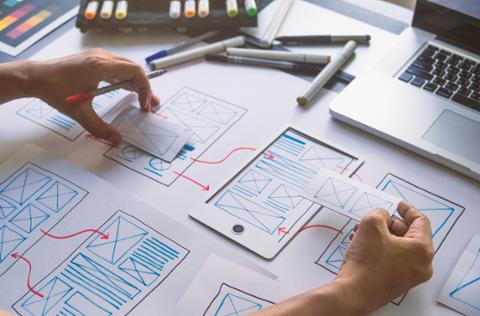Design is notoriously subjective field, which means web designers undergoing the job interview process not only need to demonstrate their technical bona fides, but be prepared to offer clear—and creative—rationales when explaining the decisions they’ve made.
Jim Halpin, Jr., technical recruiting leader for LaSalle Network in Chicago, said candidates should be prepared to explain their portfolio lucidly, while simultaneously demonstrating the unique perspective they bring to solving design problems.
Potential employers will be asking a lot of questions about the projects you’ve been working on, he suggested. They’ll want answers that are tight and focused, without rambling departures, that show your career’s linear progression.
“Be prepared to answer questions about impressions between different languages if the language the shop uses is different from your skill set,” he said. “Employers will also be asking what your involvement has been with user experience—the applicant maybe have a particular UX intermediary who helps with mockups, so that candidate might not have had to interact with users.”
In your own web designer job interview, you may encounter similar questions. For example:
- Who are some of the stakeholders you’ve had to work with. If you’ve had to work with a difficult stakeholder, how did you deal with that situation?
- What was the structure like in your previous company?
- How do you deal with changing priorities?
- Why did you choose this particular programming language or this framework?
As Halpin also noted, having the ability to create something responsive across multiple platforms will be important, and it’s important to bring up any experience in developing apps or websites for mobile devices. That includes demonstrating knowledge of how users interact with mobile devices differently vis-à-vis PCs, as well as the context in which apps or websites are used.
For example:
- How would you design an experience for a mobile phone differently than a desktop?
Web Designers: Focus on Company Specificity
To ensure your answers are geared specifically to the organization to which you’re applying, Halpin said interviewees should research the company (and the person who will be interviewing them) beforehand.
“If you know a little bit about that company’s goals, you can modify your responses to play to your strengths,” he said. “You want to have humility and you want to be yourself, [so] don’t overinflate your answers—at the end of the day, a lot of that will be exposed when you start working the job.”
He also noted that, for contract jobs, the end goals of the hiring manager can be a little different than what you’d find for full-time employees—they might need someone to come in just for a month or two. Because of that, contract jobs often emphasize autonomy in day-to-day tasks.
As the hiring manager tries to get a sense of how you envision a career, they might ask questions along the following lines:
- Where do you see yourself in six months?
- How do you envision your broader role within the company?
“For a direct hire job, there will be a lot more give-and-take from a skill set perspective,” Halpin said. “It’s not just about what you bring to the table today, but where you would be in six months—it’s a much more ‘big picture’ kind of hire.”
It’s also important to keep in mind that hiring managers are going to be looking for ways that web design candidates can offer additional skills, said Mark Kindy, lead technical recruiter for Mondo.
“They may be looking for a little bit of extra value, and there are a lot of hybrids out there, people who know how to approach web design from a development or marketing standpoint.”
Designers should be ready to tout their skills in these areas, be it user experience (UX) or motion-graphics capabilities. Be prepared to tie specific skills to the company’s end goals (especially if you’re applying to work on a particular project or product).
Here’s an example of one of these “cross-platform” skills questions:
- What is your experience with digital marketing and SEO?
And not every employer will outright ask how your skills will work with their specific product; they might try to get a more “general” sense of how you approach design. For instance:
- How do you determine which design aesthetic to use with a client, and how did you relate it to that brand?
“What’s really important is you’ve got to show passion—you have to be really into design as a whole and express that,” Kindy said. “Whatever you’ve designed your ability to reason through and convey your excitement—it has to leave a lasting impression. Why should they be excited about your design if you’re not?”



